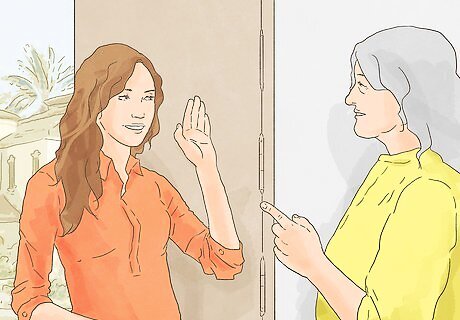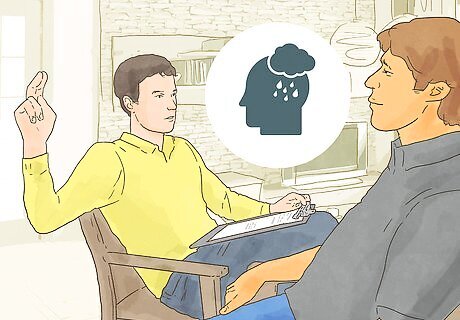
views
Handling Difficult Conversations

Say that you’re doing great. If you’re talking to someone and they seem judgmental or like they’re prying into your personal life, just say that you’re doing fine. You don’t have to share anything you don’t want to. People who are nosy don’t necessarily need to know what’s going on in your life. It’s perfectly fine to pretend that you’re doing great. For example, if you go to family gatherings and get pestered by older family members, say things are great, even if they’re not. Even if you’re sad about things, pretend like life is going okay and don’t say much beyond that.

Change the subject of conversation. If someone is talking about something you’re uncomfortable with, change the topic of conversation. Excuse yourself for a moment and come back in a bit. Shift the subject of the conversation away to something else without feeling too abrupt. If someone asks how you’re doing and you’re not prepared to say how you really feel, shift the subject by saying, “I’m really happy to see that the sun is out today.” If someone asks, “How are you and your spouse?” and you’d rather not talk about your marital difficulties, change the subject. Say, “We’re doing fine. Did I tell you about my son’s recent karate match?”

Respond minimally. Avoid saying too much or getting into detailed stories. The point is to say as little as possible and perhaps even duck out of the conversation. This will help to shut down the conversation or move on to another topic to talk about. For example, if someone asks about your love life and you’d rather not get into it, say, “Great, thanks for asking.”

End the conversation. If you can’t keep up your pretenses, end the conversation. Find a lull and speak up. For example, you can take a quick out by saying, “It’s been great talking” or “So glad we got to catch up,” and then make an exit.
Appearing Happy through Body Language

Smile. Nothing makes you look happy quite like a smile. Smile even if it feels insincere. After a bit, it might actually be real. The trick to smiling convincingly is to smile with your eyes, not just your mouth. Practice smiling with your eyes in the mirror. Whether you’re happy or not, smiling can actually help you improve your mood. If you’re trying to lift yourself out of a rut, smile as much as you can.

Make eye contact. People may wonder if something is up if you refuse to look them in the eye. Eye contact is important to maintaining conversations and communicating interest and attraction. Make eye contact with people, especially when you speak. Avoiding eye contact may look suspicious or make people think that you’re avoiding something. When making eye contact, try to smile and appear interested, engaged, and happy.

Appear open in your posture. Your body language may give away if you’re feeling sad or upset, so appearing open is important to looking happy. If you’re sitting or standing, avoid hunching your back or looking down. Hold your head up high, sit or stand up straight, and push your shoulders back and together. Exude confidence in how you carry yourself, sit, stand, and walk. Appearing small may make people wonder if something is wrong.

Keep your arms uncrossed. Crossing your arms or legs might make you appear closed off to others or like you’re hiding something. If you want to appear happy, keep your arms by your sides. If you don’t know what to do with your hands, hold something like a cup of coffee or a water bottle.
Improving Your Mood

Find reasons to laugh. Even if you’re feeling crummy, let out a good laugh. Watch a funny clip or video or read some jokes. Think of an experience that made you laugh, whether it was a joke or a fond memory in general. As with smiling, laughter can cheer you up.

Listen to upbeat music. Music can affect how you feel. If you’re trying to look or feel more cheery, try listening to some upbeat and positive music. Ditch the sad songs and listen to something lively. Even if you just want to pretend to feel happy, you might end up in a more upbeat mood. Listen to songs with positive and optimistic lyrics and songs that tend to make you feel good. Some examples might be “Happy” by Pharrell Williams and “Lovely Day” by Bill Withers.

Do things you enjoy. If you feel like you don’t even know how to be happy anymore, try doing things that used to bring you pleasure. Even if they don’t feel fun at first, stick with them and see how you feel. You might start to get your groove back and enjoy yourself. For example, if you used to love going on walks, start taking walks again. If cooking brought you joy, find something to make for dinner tonight.
Caring For Yourself

Talk to someone you trust about how you feel. Even if you’re pretending to everyone else, have one person you can talk to about how you really feel. It might a trusted friend or family member, or maybe a counselor. Sometimes it is better to stop pretending you're happy and start letting out some of your sadness or anger to someone you trust. Letting your feelings stay bottled up will cause you to feel more unhappy and can harm your overall health in the long run.

Express how you feel in some way. Maybe you can’t express your feelings while you’re at school or with other people, but make sure you find a way to acknowledge and express your emotions. Don’t hold your emotions in. Look inside yourself and try to name the feelings you feel. Then, find an outlet to help you express it. Write in a journal, write song lyrics, listen to music, dance, paint, or draw. Whatever you do, it should help you work through your feelings and express them in a meaningful way.

See a therapist if you feel depressed. If you feel like you have to pretend to be happy in order to manage your sadness or you hate to be a “buzzkill,” it might be time to consider treatment for depression. Notice if you have symptoms of depression and talk them over with a professional. They can help you manage your symptoms, prevent future episodes, and provide a place for you to share your honest feelings. Find a therapist by contacting your insurance provider or a local mental health clinic. You can also get a recommendation from a family member or friend.




















Comments
0 comment